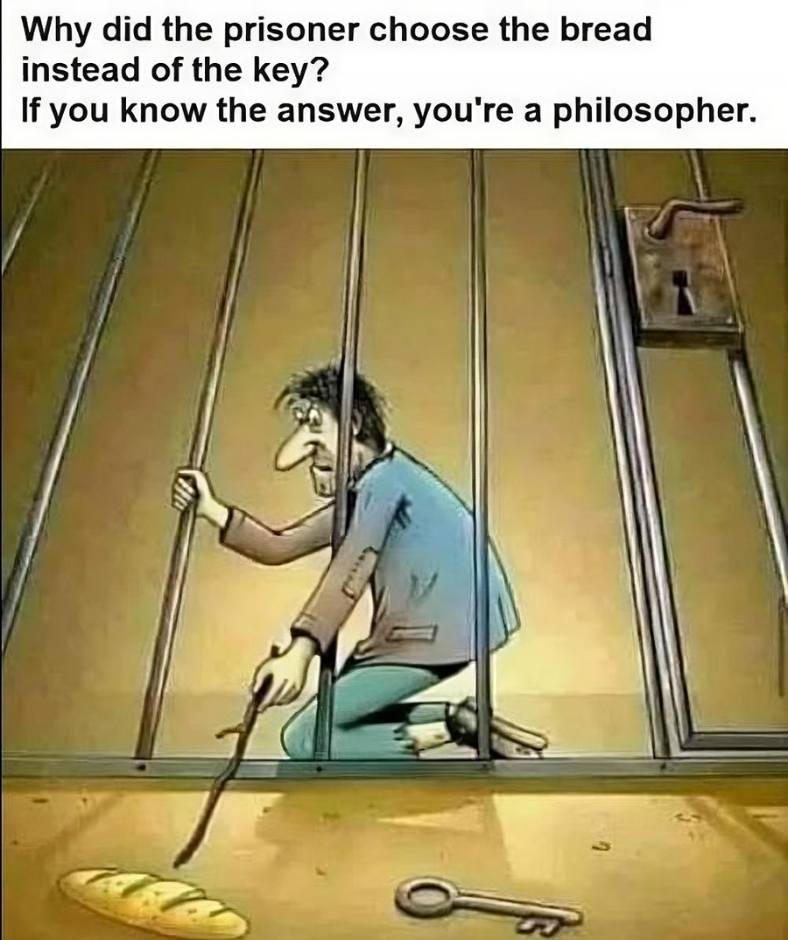In the parable “The Prisoner and the Bread,” a prisoner is faced with a challenging decision: to choose between a loaf of bread and a key to his escape. His surprising choice of bread over the key has sparked countless philosophical debates, drawing attention to the complexities of survival instincts and human decision-making. This seemingly simple scenario invites us to explore profound questions about survival, freedom, and the human condition.

At its heart, the prisoner’s decision reflects the instinctive need for survival. The bread symbolizes immediate sustenance, a basic human necessity that ensures life in the present moment. The key, in contrast, represents the promise of freedom—a chance to escape the physical confines of imprisonment. However, freedom is not without risk. For the prisoner, the choice becomes more than just a matter of preference; it is a reflection of his priorities, shaped by the harsh realities of his environment.
The contrast between bread and the key is striking. Bread offers nourishment and the energy needed to sustain life. For someone in captivity, likely deprived of adequate food, this tangible benefit might outweigh the abstract promise of freedom. On the other hand, the key symbolizes opportunity but also uncertainty. Escape could lead to freedom, but it might also result in recapture, danger, or death. In this light, the prisoner’s decision reveals a pragmatic approach to survival—addressing immediate needs before considering broader aspirations.
This philosophical dilemma was first introduced by the ancient Greek philosopher Plutarch and continues to resonate across generations. The prisoner’s choice raises essential questions: what drives human behavior when faced with conflicting priorities? Do we prioritize immediate needs, or do we take risks for the possibility of long-term rewards? By selecting the bread, the prisoner reminds us that survival often takes precedence, even over aspirations of liberty.
Bread’s significance in this scenario extends beyond nourishment. As Julia, a modern philosopher, explains, bread can also serve as a form of currency in captivity. It might be used to bribe guards, secure favors, or gain small privileges, making it a practical tool for navigating the immediate challenges of imprisonment. Julia further emphasizes that while escape might be the ultimate goal, the pressing need for sustenance often takes priority. “Escaping captivity may be a prisoner’s ultimate aim,” she notes, “but their immediate need for nourishment might take precedence.” This dual functionality of bread as both food and currency makes it a logical choice under the circumstances.
The philosophical implications of the prisoner’s decision also extend to our understanding of freedom itself. What does it truly mean to be free? Is freedom simply the absence of physical restraints, or is it a more complex state involving mental, emotional, and spiritual dimensions? By choosing bread, the prisoner may be acknowledging the limitations of physical freedom when basic survival is at stake. His decision challenges us to consider the multifaceted nature of liberation, which might encompass both tangible and intangible elements.
This parable encourages us to reflect on our own priorities and the decisions we face in challenging situations. It forces us to confront the delicate balance between satisfying immediate needs and pursuing long-term goals. The prisoner’s choice exemplifies the careful weighing of risks and benefits, a process that often defines human decision-making. Context, resources, and personal circumstances all play critical roles in shaping these choices. As Julia wisely concludes, “Whatever the decision, it is always wise to be aware of one’s own limits.”
Ultimately, “The Prisoner and the Bread” serves as a powerful metaphor for the trade-offs we encounter in life. It reminds us that every choice carries consequences and that survival and freedom are deeply interconnected yet often at odds. The prisoner’s decision to choose bread over the key reflects the complexities of human behavior, urging us to consider how we navigate our own struggles and aspirations.
This parable invites self-reflection, prompting us to examine our values, priorities, and assumptions. It challenges us to question what truly matters in our pursuit of a meaningful existence. Whether we see the prisoner’s choice as a practical survival tactic or a profound philosophical statement, it ultimately serves as a reminder of the intricacies of the human experience. Through this story, we are encouraged to embrace the challenges of life with awareness, humility, and a deeper understanding of what it means to seek freedom in all its forms.